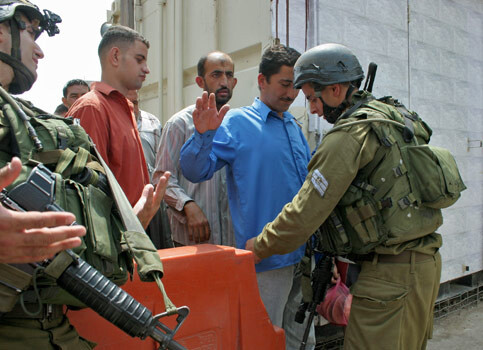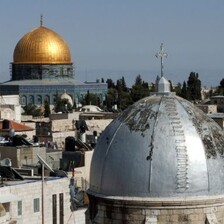The Electronic Intifada 5 September 2008

Israeli soldiers check Palestinian Muslim worshippers trying to enter the Ibrahimi Mosque in Hebron during the first Friday of the month of Ramadan, 5 September 2008. (Mamoun Wazwaz/MaanImages)
Palestinians have been historically outmaneuvered, politically neutralized, and made totally dependent on international handouts. Or have they? A newly released Palestinian strategy document which outlines strategic political options gives witness to a renewed breath of fresh air in the Palestinians’ struggle for freedom and independence.
After 60 years of dispossession and 40 years of a brutal Israeli military occupation, many of the world’s power brokers are convinced that the Palestinians are successfully being forced into submission and acceptance of the colossal injustices that have been carried out against them.
Leading the choir is the US and its Israeli ally, along with several undemocratic Arab regimes.
On the political front, they continue to take great pride in a never-ending “peace process” that has created a peace industry in Palestine, all underwritten by taxpayers from around the world. This peace process has no intention of realizing peace with justice, but rather looks to fragment Palestinians’ national aspirations into bite-sized pieces with state-like trappings — the antithesis of a state with real sovereignty, let alone self-determination.
On the security front, they claim that the Palestinian Authority (referring to the unelected government of Salam Fayyad in Ramallah) is excelling by installing a heavy-handed security regime, frighteningly reminiscent of the undemocratic, police-state Arab regimes such as Egypt, Jordan and the entire batch of oil-rich Gulf states, which the US has propped up for decades. Driven by US General Keith Dayton and sanctioned by the Ramallah-based Palestinian leadership, this security-heavy thrust of activity appears to many observers to be nothing more than another outsourcing option for an Israeli version of its own “security” needs.
On the economic front, they point to grand plans to establish a handful of industrial mega-zones, the majority being located on the unilaterally-defined (illegal) Israeli border between the West Bank and Israel. These industrial zones are meant to absorb the over 150,000 Palestinian laborers that Israel has prohibited from working in Israel. Moreover, as I was recently told by an Israeli promoting these industrial zones, for every job created in such a zone, three will be created for Palestinians outside the industrial zones — thus, in essence, creating an entire artificial economy built around Palestinian and foreign-owned, but Israeli-controlled economic bubbles.
The 1.5 million Palestinians trapped by Israel in the world’s largest open air prison, Gaza, are not even a part of the discussion.
In short, the approach of the international community is one of creating a dynamic whereby Palestinians co-exist, not with their Israeli neighbors, but rather with the system of Israeli military occupation, or put simply, sugar coating the status quo which benefits Israel.
What the international community fails to mention is that the dynamic on the ground is explosive. The Israeli military occupation is alive and well and causing structural, possibly irrevocable damage to Palestinian lands and persons. The Jewish-only Israeli settlement enterprise is off the leash and building more and more illegal settlements as if there were no tomorrow, not to mention the increasing tides of settler violence which remains unpunished. All this settlement activity is happening with full approval of the Israeli government and in full view of the international community. The failing (or failed) health care and education systems in Palestine are producing a generation of Palestinians with much less to lose and little hope for the future.
Those who have dealt the Palestinians out of the equation for the future of Palestine need to take a closer look at history and at the struggle of this great people. Palestinians recognize better than most the dangers that are posed by the current powder keg of internal disunity and foreign intervention into their livelihoods. Palestinians know better than anyone else that the current state of affairs generates tremendous fear as their struggle for freedom and independence is set back by decades. Yet, at defining times in their history Palestinians have always reclaimed the initiative and carried on, like any oppressed and struggling people are wont to do.
Over the past several months, I participated together with a group of 45 Palestinians from all walks of life — men and women, on the political right and left, secular and religious, politicians, academics, civil society and business actors, from occupied Palestine, inside Israel, and in the Diaspora. We were a group that is a microcosm that reflects the dynamics of the Palestinian society. We could not all meet in one room anywhere in the world because the reality (of travel restrictions) that Israel has created does not permit it, nevertheless we continue to plan and to act. Our mission is to open a discussion on where we go from here: What are the Palestinians’ strategic options to end the Israeli occupation, if any?
After several workshops in Palestine and abroad and a continuous online debate we have produced the first iteration of “Regaining The Initiative: Palestinian Strategic Options To End Israeli Occupation.” The document is posted at www.palestinestrategygroup.ps and reflects an alternative to an official but impotent Palestinian discourse that will very shortly, in the judgment of most Palestinians, run head-on into a brick (cement) wall.
Palestinian society is a dynamic, thinking society which has been so battered and demeaned by Israel and its supporters that many folk, including many Palestinians themselves, will be surprised that the Palestinians have any options whatsoever. One thing is for sure: no matter how long the illegal Israeli occupation continues, do not expect the Palestinians to wake up one morning and accept that they are somehow less human than any other free person in this world.
The Palestinian people have given everyone — including their own traditional leadership — plenty of time to end this humiliating and brutal occupation. When all else fails, Palestinians will reclaim the initiative, and will continue to do so over and over, until this occupation is consigned to the trash bin of history, along with all the war criminals who allowed it to persist for so many years.
Sam Bahour lives in occupied Palestine and is co-editor of Homeland: Oral History of Palestine and Palestinians. He may be reached at sbahour AT palnet DOT com.





